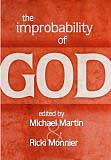Book Description
A growing number of powerful arguments have been formulated by philosophers and logicians in recent years demonstrating that the existence of God is improbable. These arguments assume that God’s existence is possible but argue that the weight of the empirical evidence is against God’s actual existence. This unique anthology collects most of the important arguments for the improbability of God that have been published since the mid-1900s. The editors make each argument clear and accessible by providing a helpful summary. In addition, they arrange this diverse collection of arguments for the improbability of God into four thematic groups:
- Part 1 – Cosmological arguments based on the weight of the evidence relative to the origin of the universe
- Part 2 – Teleological arguments based on the weight of the evidence relative to the order in the universe
- Part 3 – Inductive evil arguments based on the weight of the evidence relative to the widespread and horrendous evil in the world
- Part 4 – Nonbelief arguments based on the weight of the evidence relative to the widespread nonbelief or the reasonable nonbelief in the world.
The list of distinguished authors includes:
- William Rowe
- Theodore Drange
- Quentin Smith
- Victor Stenger
- J. L. Schellenberg
- Michael Martin
- (and others)
With this new anthology as a companion to their earlier anthology, The Impossibility of God (2003), Martin and Monnier have created an indispensable resource in the philosophy of religion.
Table of Contents
Preface
General Introduction
Part 1: Cosmological Arguments Against the Existence of God Introduction:
- Victor J. Stenger, “The Scientific Case Against a God Who Created the Universe”
- Theodore Schick, Jr., “The Big Bang Argument for the Existence of God”
- Quentin Smith, “Atheism, Theism, and Big Bang Cosmology”
- Quentin Smith, “A Defense of the Cosmological Argument for God’s Nonexistence”
- Quentin Smith, “Big Bang Cosmology and Atheism”
- Quentin Smith, “Stephen Hawking’s Cosmology and Theism”
- Quentin Smith, “Why Stephen Hawking’s Cosmology Precludes a Creator”
Part 2: Teleological Arguments Against the Existence of God Introduction:
- Nicholas Everitt, “The Argument from Scale”
- Victor J. Stenger, “The Anthropic Coincidences: A Natural Explanation”
- Michael Ikeda & Bill Jefferys, “The Anthropic Principle Does Not Support Supernaturalism”
- Wesley C. Salmon, “Religion and Science: A New Look at Hume’s Dialogues”
- Wesley C. Salmon, “Experimental Atheism”
- Michael Martin, “Atheistic Teleological Arguments”
- Bruce and Frances Martin, “Neither Intelligent nor Designed”
- Richard Dawkins, “The Improbability of God”
Part 3: Inductive Evil Arguments Against the Existence of God Introduction
- Quentin Smith, “An Atheological Argument from Evil Natural Laws”
- William L. Rowe, “The Problem of Evil and Some Varieties of Atheism”
- William L. Rowe, “Evil and Theodicy”
- William L. Rowe, “The Evidential Argument from Evil: A Second Look”
- William L. Rowe, “Reply to Plantinga”
- William L. Rowe, “Skeptical Theism: A Response to Bergmann”
- Michael Martin, “An Indirect Inductive Argument from Evil”
- Thomas Metcalf, “An Argument from Non-Gratuitous Evil”
Part 4. Nonbelief Arguments Against the Existence of God
Introduction
- Theodore M. Drange, “The Argument from Nonbelief”
- Theodore M. Drange, “McHugh’s Expectations Dashed”
- Victor Cosculluela, “Bolstering the Argument from Nonbelief”
- Theodore M. Drange, “The Arguments from Confusion and Biblical Defects”
- Walter Sinnott-Armstrong, “The Argument from Ignorance”
- Walter Sinnott-Armstrong, “The Real Argument from Ignorance”
- J. L. Schellenberg, “An Argument for Atheism from the Reasonableness of Nonbelief”
- J. L. Schellenberg, “Response to Howard-Snyder”
- J. L. Schellenberg, “Divine Hiddenness Justifies Atheism”
Appendix
- Paul Thiry d’Holbach, “The Ideas of the Divinity”




